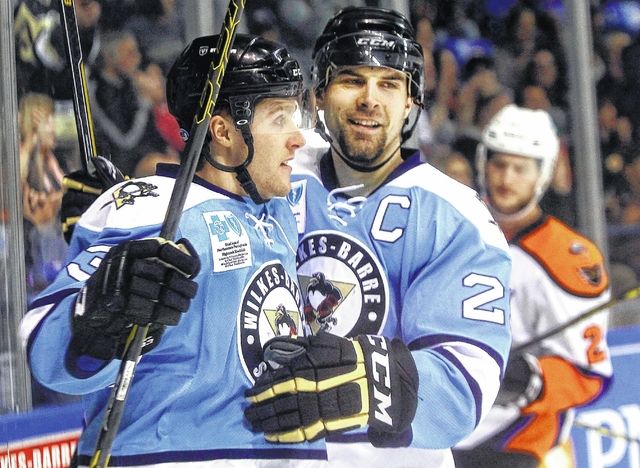Click here to subscribe today or Login.
Last year, former Wilkes-Barre/Scranton Penguin Chris Collins wrote an article for The Players’ Tribune, a media company founded by Derek Jeter to gives athletes a platform to share their experiences with fans.
Collins wrote about the uncertainties of life after hockey and how the transition from professional hockey player to working in the real world can be difficult.
It’s a challenge that all hockey players will face, and Collins’ account did catch the attention of a few current Penguins.
Tom Kostopoulos said the end of a career is something every player struggles with and, a week away from his 37th birthday, knows that he will soon make that same transition.
Preparing for that day, however, can be just as challenging as facing the reality.
“It’s tough to tell a player who has always been so focused on the game to start thinking about what they’re going to do when they’re done,” Kostopoulos said. “Early in my career someone told me it’s good to get your mind off the game and think about other things. But when you’re working hard always trying to get to the next level, it’s tough. Your mind and body are dedicated to the game.”
But that doesn’t mean some players aren’t preparing for their future even while their playing career is in full-swing. Kostopoulos said he’s had teammates take college courses in between games and practices. The Professional Hockey Players’ Association does have a career enhancement program to assist players with the transition of life after hockey.
Kostopoulos said it’s up to the player to take the lead.
“The individual has to take the initiative. Every player has a different background, interests and education that they can use,” Kostopoulos said. “Some guys might want to go back to the family farm and other might get into business. There’s no set path.”
Defenseman Steve Oleksy established his path before his pro career began. When Oleksy finished his college hockey career at Lake Superior State University, he never expected to play a game in the pro ranks. The bigger question for Oleksy at the time was what to do after college?
To prepare for that transition, Oleksy started his own business and he’s kept it active throughout his hockey career knowing that, one day, it’s something he’ll need.
“A lot of players fail to realize it’s a short-lived career. You play with a lot of guys who have no plan and it hits them all at once,” Oleksy said. “You go from being at the rink four hours a day with a lot of free time and not having to work a regular job. It’s a huge adjustment.”
Kostopoulos said the key to dealing with that adjustment is making sure you have options available for a career after hockey. That means making a commitment to allot some time away from the rink to prepare for the future, he said.
Kostopoulos recalled former Carolina Hurricane teammate Jay Harrison as the perfect example of preparing for life after hockey.
“After games on the bus a bunch of us would be playing cards and he was studying for his college courses,” Kostopoulos said. “He wanted to be a doctor, and I always respected that he knew what he wanted to do and prepared himself to step right into it after he retires.”
Preparation is even more critical considering when most players leave the sport they’re at an age where others have already established careers in the real world.
Oleksy said players who play in juniors and then in college might be 25 or 26 years old by the time they graduate and turn pro.
“Most people are already working at 21 and jobs are a lot harder to get when you’re older,” he said. “It puts you behind the 8-ball trying to start a career in your mid-30s.”
Kostopoulos said age is one of the biggest challenges. A lot of players can’t see themselves going back to college in their 30s, yet it’s a tough age to start a new career in life.
Kostopoulos admits he’s not sure what he wants to do after hockey, but stressed that his wife and kids will be a major part of the decision.
“People might overlook just how much a player’s wife has sacrificed in their lives so we can chase our careers,” he said. “Sometimes when we’re done playing, maybe it’s their turn to pursue a career that they’ve wanted.”





